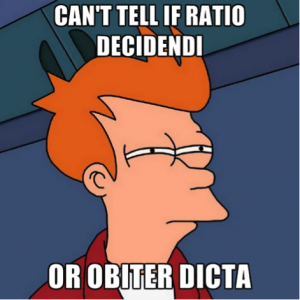By Prof Judith Masson, Professor of Socio-Legal Studies (University of Bristol Law School).
 One key piece of knowledge all law students are expected to grasp early on in their legal career is the difference between what a judge says – dicta or obiter dicta and what a case means – the ratio or ratio decidendi. Even when they know the difference, students and practising barristers often prefer to reach for a quotation from a case. It can be comforting to use a well-rounded phrase from Smith J or Jones LJ and it may at first glance suggest wisdom when it really is just about memory. However, reliance on dicta is a really bad habit, does not make better lawyers and can seriously undermine what the law means.
One key piece of knowledge all law students are expected to grasp early on in their legal career is the difference between what a judge says – dicta or obiter dicta and what a case means – the ratio or ratio decidendi. Even when they know the difference, students and practising barristers often prefer to reach for a quotation from a case. It can be comforting to use a well-rounded phrase from Smith J or Jones LJ and it may at first glance suggest wisdom when it really is just about memory. However, reliance on dicta is a really bad habit, does not make better lawyers and can seriously undermine what the law means.
In the hands of some judges dicta are powerful ways of communicating ideas – judicial soundbites – which make the case and the judge memorable. Lord Denning was a past master at this, making it easy to remember the facts of cases, but not always the law. Indeed Lord Denning’s skill with language enabled him to make or even make up law. Of course he was largely dealing with Common Law, developing contract and tort law rather than interpreting statute. (more…)
